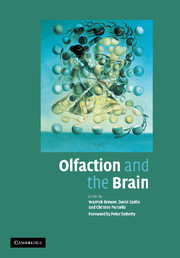Book contents
- Frontmatter
- Contents
- Foreword
- Preface
- List of Contributors
- Section I Neurology, Neurophysiology and Neuropsychology: Olfactory Clues to Brain Development and Disorder
- Section II Social Functioning: Role of Evolution, Genetics and Gender
- Section III Assessment and Disorders of Olfaction
- 13 Assessment of Olfaction
- 14 Olfactory Impairment in Neuropsychiatric Disorders
- 15 Olfaction in Parkinsonian Syndromes
- 16 Olfaction in Psychosis
- 17 Olfactory Hallucinations
- 18 Delusions of Body Malodour: The Olfactory Reference Syndrome
- Index
- Plate section
- References
13 - Assessment of Olfaction
from Section III - Assessment and Disorders of Olfaction
Published online by Cambridge University Press: 17 August 2009
- Frontmatter
- Contents
- Foreword
- Preface
- List of Contributors
- Section I Neurology, Neurophysiology and Neuropsychology: Olfactory Clues to Brain Development and Disorder
- Section II Social Functioning: Role of Evolution, Genetics and Gender
- Section III Assessment and Disorders of Olfaction
- 13 Assessment of Olfaction
- 14 Olfactory Impairment in Neuropsychiatric Disorders
- 15 Olfaction in Parkinsonian Syndromes
- 16 Olfaction in Psychosis
- 17 Olfactory Hallucinations
- 18 Delusions of Body Malodour: The Olfactory Reference Syndrome
- Index
- Plate section
- References
Summary
Introduction
Disorders of the sense of smell, which are responsible for most patients' reports of loss of taste, can profoundly influence quality of life. Among 750 patients presenting to our centre with largely olfactory problems, 68% experienced altered quality of life, 46% described changes in appetite or body weight, and 56% reported influences in daily living or psychological well-being (Deems et al., 1991). In addition to the obvious safety consequences of chemosensory dysfunction (e.g. inability to detect leaking gas, spoiled food, smoke, or such hazards as burning electrical wires or cooking food), smell disturbances often adversely affect nutrition, particularly in the elderly, and can result in depression and the generation of feelings of physical and social vulnerability, as well as of victimisation (Van Toller, 1999). The importance of normal smell function in everyday life is highlighted by the consequences of its loss in those who depend on it for their livelihood (e.g. cooks, homemakers, firefighters, plumbers, wine merchants, chemical plant workers).
Olfactory problems are not uncommon, being present in 1 to 2% of the population under the age of 65 years, and in more than 50% of people older than 65 years (Doty et al., 1984; 1986; Hoffman et al., 1998; Schiffman, 1983). As noted in Chapters 14 and 15 of this volume, decrements in olfactory function are among the first clinical signs of Alzheimer's disease and idiopathic Parkinson's disease, and are commonly present in epilepsy, multiple sclerosis and schizophrenia (for a review, see Doty, (2003a); see also Moberg & Turetsky, Chapter 16).
Keywords
- Type
- Chapter
- Information
- Olfaction and the Brain , pp. 235 - 258Publisher: Cambridge University PressPrint publication year: 2006
References
- 5
- Cited by

